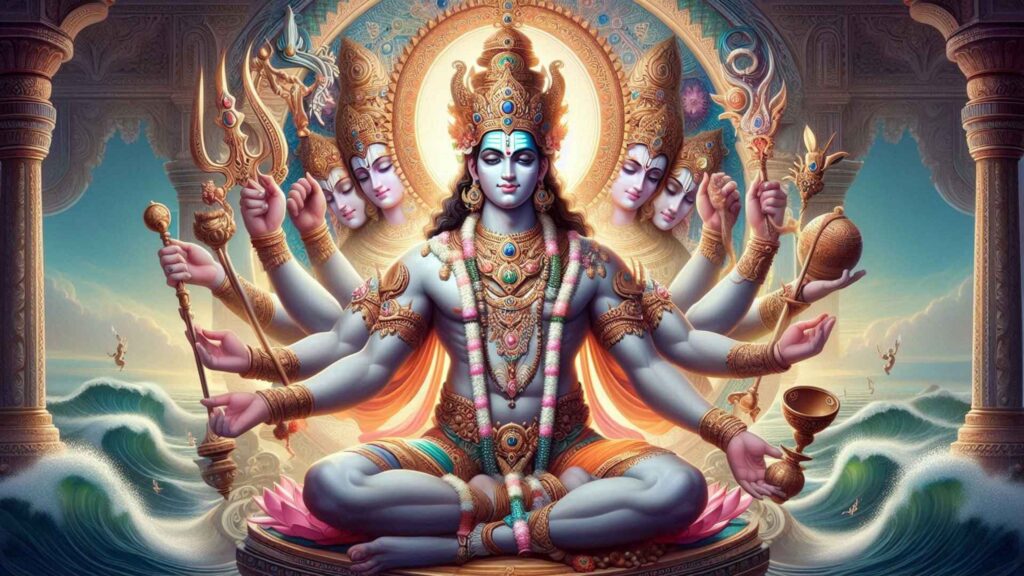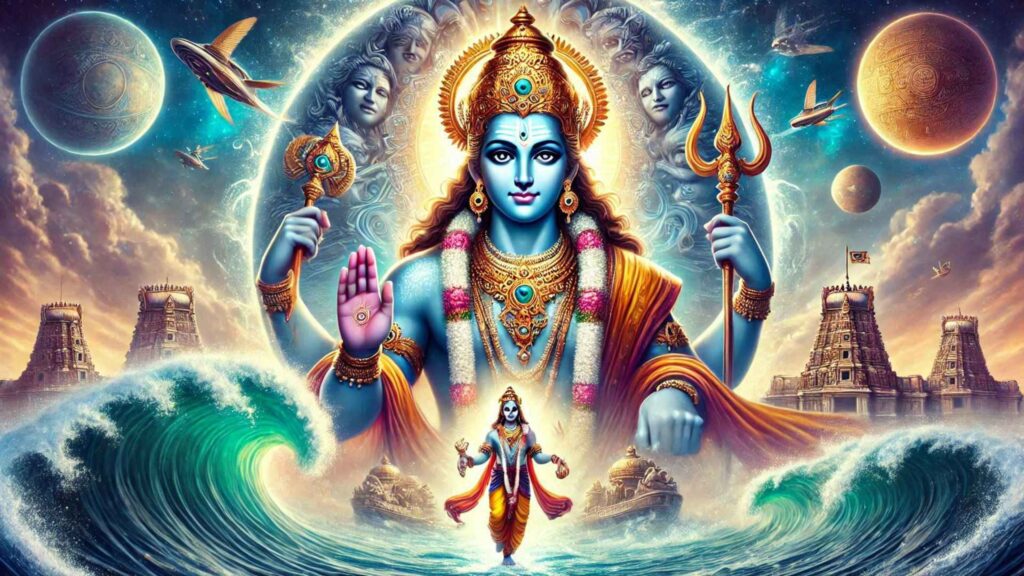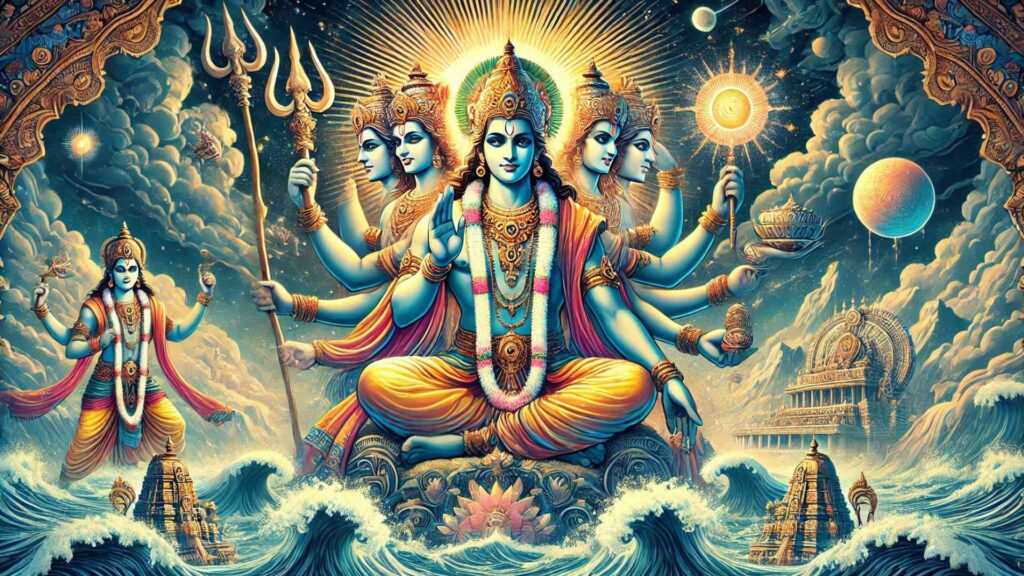Vishnu: The Preserver of the Universe in Hinduism
Introduction
Brief Overview of Vishnu in Hinduism
Vishnu, one of the principal deities in Hinduism, is revered as the preserver and protector of the universe. He is part of the Hindu trinity (Trimurti), alongside Brahma, the creator, and Shiva, the destroyer. Vishnu’s primary role is to sustain balance in the cosmos by intervening whenever evil threatens dharma (cosmic order). His avatars (Dashavatara), including Krishna and Rama, are celebrated across Hindu traditions for their divine deeds.
Read More About Deities And Gods
Significance of Vishnu in Daily Hindu Life
Vishnu is deeply integrated into Hindu culture and spirituality, symbolizing compassion, righteousness, and the eternal sustenance of life. Devotees invoke him for blessings of protection, success, and harmony in their lives. Recitation of his mantras, such as “Om Namo Narayanaya”, forms a vital part of daily prayers.
Cosmic and Spiritual Importance
Vishnu’s cosmic role as the preserver ensures the continuity of existence. Spiritually, he represents the infinite energy that upholds creation and guides individuals on their path to moksha (liberation). His presence fosters faith, hope, and adherence to dharma.
Names and Etymology

Meaning of Vishnu
The name “Vishnu” is derived from the Sanskrit root Vish, meaning “to pervade” or “to encompass.” This reflects his omnipresence and his role as the sustainer of the cosmos.
Other Names and Their Significance
- Narayana: The resting place of all beings, emphasizing his role as the eternal refuge.
- Hari: The remover of sins and afflictions.
- Govinda: Protector of cows, symbolizing nurturance and care.
- Madhava: The husband of Lakshmi, highlighting his connection to wealth and prosperity.
- Vishwaroopa: The universal form, symbolizing his omnipresence.
Each name underscores Vishnu’s divine attributes, making him accessible to devotees in various aspects.
Symbolism and Iconography

Physical Description and Its Meaning
Vishnu is traditionally depicted as a blue-skinned deity with four arms, holding a conch (shankha), discus (chakra), mace (gada), and lotus (padma). He reclines on the serpent Ananta (Shesha) in the cosmic ocean, symbolizing his transcendence and infinite nature.
Symbolism
- Conch (Shankha): Represents the sound of creation and divine truth.
- Discus (Chakra): Symbolizes the cycle of time and the destruction of evil.
- Mace (Gada): Denotes strength and authority.
- Lotus (Padma): Reflects purity, enlightenment, and divine beauty.
- Blue Skin: Represents the infinite and eternal nature of the divine.
The Flower Connection
The lotus, often associated with Vishnu, signifies spiritual awakening, detachment, and purity. It reflects his ability to remain untainted while sustaining the universe.
Colors and Symbols Associated
- Colors: Blue (infinity), gold (prosperity), and white (purity).
- Symbols: Serpent Ananta, lotus, and the Vishwaroopa (universal form).
Mythology and Stories

Birth Story
While Vishnu has no literal birth, he is often associated with the cosmic ocean (Ksheer Sagar), emerging to preserve balance in the universe. In creation myths, he is depicted as resting on Ananta, while Brahma, the creator, emerges from a lotus growing from his navel.
The Dashavatara
Vishnu’s ten avatars showcase his intervention to restore dharma:
- Matsya (Fish): Rescued sacred texts and the world during the cosmic flood.
- Kurma (Tortoise): Supported the churning of the ocean to obtain divine nectar.
- Varaha (Boar): Rescued the Earth from the demon Hiranyaksha.
- Narasimha (Man-Lion): Protected Prahlada and destroyed Hiranyakashipu.
- Vamana (Dwarf): Reclaimed the universe from Bali.
- Parashurama: Destroyed corrupt Kshatriya rulers.
- Rama: Embodiment of virtue and hero of the Ramayana.
- Krishna: Teacher of the Bhagavad Gita and slayer of evil.
- Buddha: Enlightened teacher (interpreted in some traditions).
- Kalki: Future avatar yet to appear, ending the current age of darkness (Kali Yuga).
Role in Ramayana and Mahabharata
- Ramayana: Vishnu incarnates as Rama, showcasing ideal virtues as a son, husband, and king.
- Mahabharata: As Krishna, he guides Arjuna through the Bhagavad Gita, imparting wisdom on duty, devotion, and selflessness.
Famous Blessings and Boons
Vishnu’s blessings include protection from harm, liberation from sin, and the fulfillment of righteous desires. His devotees often experience spiritual growth and inner peace through his grace.
Spiritual Significance
A Visible Form of God
Vishnu is considered the most accessible form of God for devotion, appearing through idols, mantras, and sacred texts to guide humanity.
Representation of Knowledge and Enlightenment
Through his teachings in the Bhagavad Gita, Vishnu represents wisdom and the path to spiritual awakening, encouraging individuals to act selflessly and align with dharma.
Connection to Spiritual Awakening
Vishnu’s role as the preserver reminds devotees to balance material and spiritual pursuits, fostering inner growth and enlightenment.
Role in Yoga and Meditation Practices
Vishnu is associated with the Anahata Chakra (heart chakra), symbolizing love, balance, and harmony. Meditating on his form fosters emotional and spiritual well-being.
The Mantra Connection
- “Om Namo Narayanaya”: Invokes Vishnu’s blessings for peace and liberation.
- “Om Vishnave Namah”: Offers devotion to Vishnu as the cosmic preserver.
Worship and Rituals
Benefits of Worship
Worshiping Vishnu grants protection, prosperity, and spiritual clarity. Devotees experience a deeper connection to the divine and the path of righteousness.
Daily Worship Practices
- Offering tulsi leaves, flowers, and incense to Vishnu idols.
- Reciting the Vishnu Sahasranama (thousand names of Vishnu).
Best Times for Worship
- Early mornings, during auspicious periods like Ekadashi (11th day of the lunar cycle).
Significance of Day
- Thursday: Dedicated to Vishnu, marked by fasting and prayers.
Important Festivals
- Vaikuntha Ekadashi: Celebrates Vishnu’s divine abode.
- Krishna Janmashtami: Marks Krishna’s birth.
- Rama Navami: Celebrates Rama’s birth.
List of Famous Temples
- Sri Ranganathaswamy Temple, Tamil Nadu
- Badrinath Temple, Uttarakhand
- Tirupati Balaji Temple, Andhra Pradesh
Modern Relevance
Scientific Understanding
Vishnu’s symbolism aligns with the importance of balance and sustenance in ecosystems, encouraging harmony in nature and life.
Environmental Consciousness
The preservation aspect of Vishnu inspires efforts toward sustainability, conservation, and ecological balance.
Health Benefits
Meditating on Vishnu’s form and chanting his mantras reduce stress, enhance focus, and promote emotional stability.
Energy Connection
Vishnu embodies universal energy, guiding individuals to align with their purpose and maintain inner balance.
Sustainable Living Practices
His teachings encourage moderation, gratitude, and respect for nature’s resources.
Cultural Impact
Influence on Indian Art and Architecture
Vishnu’s form has inspired temple designs, sculptures, and paintings, portraying his grandeur and cosmic role.
Presence in Literature and Poetry
The Vedas, Puranas, and epics like the Ramayana and Mahabharata celebrate Vishnu’s virtues and cosmic deeds.
Impact on Daily Customs
Daily prayers, fasting on Ekadashi, and celebrating Vishnu-centric festivals reflect his integration into Hindu life.
Regional Variations in Worship
Vishnu is worshiped differently across India, from Vaishnavism in the north to Vishnu-centric traditions in southern temples.
Practical Applications
Morning Prayers and Rituals
Reciting Vishnu mantras at dawn fosters mental clarity, peace, and focus.
Benefits of Salutation
Bowing to Vishnu invokes his blessings for protection, harmony, and spiritual growth.
Dietary Recommendations
Observing vegetarianism on Thursdays and Ekadashi reflects devotion and adherence to purity.
Astrological Significance
Vishnu’s worship is believed to pacify planetary imbalances and foster prosperity.
Gemstones and Metals Associated
- Gemstones: Sapphire and emerald for clarity and wisdom.
- Metals: Gold and silver, symbolizing prosperity and purity.
Conclusion
Summary of Importance
Vishnu, as the preserver of the universe, embodies compassion, wisdom, and eternal sustenance. His teachings inspire devotion, righteousness, and a balance between material and spiritual life.
Universal Message
Vishnu’s presence reminds humanity of the importance of maintaining balance, adhering to dharma, and striving for harmony in all aspects of life.
Call to Action
Celebrate Vishnu by practicing gratitude, following dharma, and embracing his teachings for a fulfilling and spiritually enriched life.


